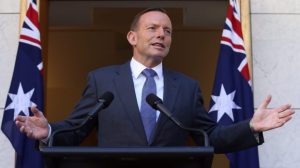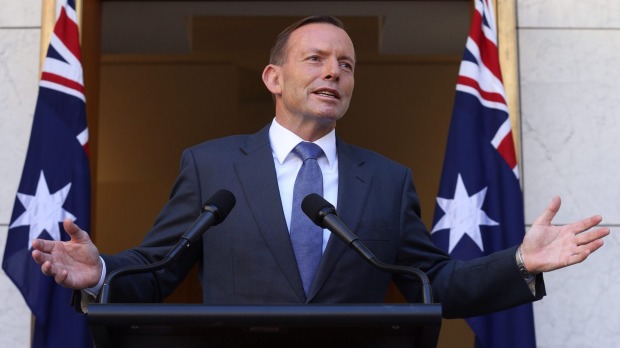 Yesterday Abbott apologised – well sort of. There’s a lesson here in Crisis PR.
Yesterday Abbott apologised – well sort of. There’s a lesson here in Crisis PR.
In this case the crisis is a failure to sell the budget. Abbot’s mea culpa was specifically about the broken promise not to cut budgets at the ABC and more generally about the perception that the overall baudget cuts are too harsh.
An apology is asking for forgivness. So, why is Australia generally not receptive?
Background
We think Joe Hockey almost sold us on his savage budget cuts, but we also think failure became clear just before the MH17 catastrophe.
But MH17 was one of a series of overseas events (ISIS, shirtfronting Putin, etc.) that took Tony Abbott and the media on what became, in effect, foreign affairs distractions. The budget was off the front pages.
But it’s a mistake to think that strategically a distraction means a problem goes away. A distraction is just a distraction.
In Crisis PR in the corporate world you exploit these sideshows to give you time to devise a strategy to right a wrong. That’s not being cynical, just smart.
We can now surmise that Abbott/Hockey didn’t do that. Otherwise, why would he have blundered on, breaking an election promise and hacking into the ABC.
What the PM could have done is used that pause to start fixing the problem that Hockey created; then come off the back of the ‘high’ generated by the foreign affairs wins, and announce (before the G20 event in Brisbane) the ‘new’ fix-ups
Crisis PR: Righting a wrong
There is an almost foolproof Crisis PR formula for fixing a mistake. It’s can’t be cynically done and it relies on being delivered with integrity. But to be believable it takes the four steps. Oddly if you miss one step, or are out of sequence, the correction appears incomplete:
- Apologise: it has to be genuine and it must be specific. Do don’t have to say “Sorry”, but you do need to ‘fess up to a mistake. And it has to speak to the right stakeholders. In this case that should have been the PM speaking to Australians; or an Abbott/Hockey exercise if Abbott wanted to save Hockey.
- Analyse the failure: this means reiterating what was done, or attempted, and what went wrong. This step is important to ensure the apology is not seen as ‘half-hearted’. Unlike the Abbott apology yesterday, it requires spelling out the purpose of what was attempyted (return to a surplus) and the strategy (everyone shares some of the pain) and then the tactical failure (too harsh). It has to be clearly enunciated with no ‘buts’. One failure of yesterday’s apology is that it was full of ‘buts’ – self-justifications. A convincing apology is a mea culpa (my fault), without justifying.
- Promise a comprehensive inquiry: once you’ve fessed-up to an error and offered your analysis, you can’t just head off on a different tangent and expect to keep faith with the public. To regain trust you really need an independent inquiry into what needs to be done to right the wrong. Again, ‘independent’ inquiries are on the nose, so it needs to be seen to be genuine. (In lesser situations a customer survey or similar may suffice).
- Deliver on the inquiry’s recommendations: Finally, regaining trust relies on the organisation sticking with it’s commitment – deliver on the inquires recommendations, or the survey results.
So, he shouldn’t have announced the newly installed ‘Mr Fixit’, Michael Thawley, the day before yesterday, without first an apology and analysis. It’s out of sequence. Don’t you think it makes Thawley’s appointment look like a knee-jerk instead of a considered response following the analysis? And any of his recommendations may be seen to be proof of Hockey’s failure, instead of a considered new direstion for the government.
installed ‘Mr Fixit’, Michael Thawley, the day before yesterday, without first an apology and analysis. It’s out of sequence. Don’t you think it makes Thawley’s appointment look like a knee-jerk instead of a considered response following the analysis? And any of his recommendations may be seen to be proof of Hockey’s failure, instead of a considered new direstion for the government.
It also probably marks Hockey as politically dead because it’s now hard for him to be part of the solution. You can’t really back him in. This means Abbott will have one more enemy in the ranks. More Crisis PR!
Had Abbott/Hockey started down this four-part reform (we think before the G20 gathering) the environment might now be entirely different. The Victorian election might have been more closely fought. The mood of the government backbench might be upbeat. And Abbott might have re-thought lying about the ABC.
How does Abbott now dig the government out of the hole? Well, it’s not too late, just much harder.
Crisis PR: It takes a strategist
The difficulty for the government is that while Abbott is a great tactician, he’s not a great strategist. As we’ve observed a number of times, his M/O has always been short term tactics built around one-liners, learned in opposition and refined in government.
It takes a strategist to analyse problems and then craft solutions that don’t involve reaching for the band-aids.





